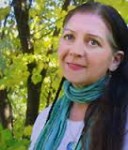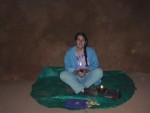Page 1 Page 2
Now Sinead presents as a powerful, successful woman, and Connor is growing, too. The only way she could help him change was by looking after herself.
Therapists write books helping people avoid this behavioral trap, often called “codependency.” The codependent person thinks he is helping others, but often he is only deflecting his own fears. Nobody grows in that situation.
You can see stories like this every day on TV, but Dr. Phil did not invent these ideas. They’ve been known for millennia. Buddhism identifies the self as the core of all change. They have a practice called Metta, often translated as “loving kindness.” Metta calls on a meditating person to send loving kindness to the entire world, including people you don’t like, people you do like, animals, plants, family, everyone. But first you send metta to yourself. Often practitioners are advised to start by directing metta to their hearts, then to their bodies, and then to their whole selves.
Buddhist teacher Sharon Salzberg writes, “We begin by directing metta toward ourselves. This is the essential foundation for being able to offer genuine love to others.”
Starting with yourself is key in so many areas of life. I have been trying for years to cultivate a nonjudgmental attitude. I have experienced how much more clearly I can see the world when I’m not judging it. It’s more beautiful; I’m more relaxed. I can lose that rhythm in a moment, though, by sliding into judging myself.
Say a beggar asks me for money or just holds out a cup. However much I give or don’t give, I can judge myself for it: “I was selfish;” “I was a sucker,” “I didn’t do it right,” or “That was very generous of me.” When I’m thinking thoughts like those, how likely am I to judge others? You would almost have to. Nonjudgment starts with yourself.
Like nonjudgment, forgiveness is a powerful healing force, but do you think you can forgive others if you don’t forgive yourself? How would you do that? Instead, we need to practice forgiving ourselves as we would forgive a loved one who did the same thing. Then we might be able to stop resenting other people.
Healing starts with you
Helping others heal requires attending to our own wounds. Have you noticed how many “helping professionals” are trying to heal themselves without admitting it? I went into nursing because I was worried about my own health. My friend Sue started physical therapy school because of a shoulder injury. Something like 74%% of psychologists and psychotherapists surveyed had mental health issues of their own they are trying to control.
The great psychiatrist Carl Jung called these people “wounded healers.” They’re everywhere, and in some ways they can be helpful. Jung said the wounded healer has the capacity to be “at home in the darkness of suffering and there to find germs of light and recovery.” She’s not afraid to get close to someone else’s pain and take their hand to lead them out of their cave.
Jung famously said, “Only the wounded doctor heals.” A healer has to have experience of suffering to know the landscape and the way out. In reality, though, wounded healers can only take you so far. They bleed all over you. It’s very difficult for the wounded healer to separate their wounds from yours.
A conscientious healer can perhaps avoid this confusion in himself and the patient. Jung said, “A good half of every treatment that probes at all deeply consists in the doctor’s examining himself.” But that’s a lot of self-examination, and few healers are consistent enough with it to avoid hurting their patients.
Eileen Lighthawk is a teacher, wholeness practitioner and creative empowerment consultant who trained and practiced for decades as an indigenous healer. Lighthawk says a healer who was never wounded is like “a kid just out of school with a textbook as a guide.” A wounded healer, though is like “someone who has a map of the road from San Francisco to Seattle but has never been down the road himself.”
What you want is someone who has been wounded but has healed. “If you’ve been through shit and gotten out of it, you have something to offer,” she says, “as long as you understand that your way is not the only way.”
So you can’t help others heal until you heal yourself. “You don’t go into the cave with them,” says Lighthawk. “You hold the door open so they see that there is light and, when they’re ready, pull themselves toward the light in their own way. Rather than share pain, you can model healing.”
Social change begins with you
If you don’t follow Lebanese cinema, you may not have seen the 2011 film Where Do We Go Now? But you should. It tells about a remote mountain village, half Christian and half Muslim, in which the women try to keep peace as religious war engulfs the country.
The women try everything to keep their men from going to war with each other. They cut off the TV and radio transmission and block newspapers from coming into town, so the men won’t learn of the latest violence. They hire Ukranian exotic dancers who are touring in a nearby city to entertain the men and bring them together, while the women bury all the guns in the village.
[Spoiler Alert]
Nothing works. The men are getting closer to violence by the hour. Then the women drug the men with hashhish ground into their sweet potatoes, and while they sleep it off, the women all convert. The Christian women put on hijabs and start saying Muslim prayers. The Muslim women put on Western dresses and go to church. They say to the men, “If you want to fight [the other], you’ll have to start with me.”
[End Spoiler Alert]
That finally brings the men to their senses. The rest of the country is still going crazy, so the village remains endangered, but the men do change. But first the women had to change themselves. They couldn’t change anything from the outside, but by starting with themselves, they could.
This fictional story is a powerful lesson that applies to any effort at social change. People have to change themselves if they are to embrace those they have never trusted before. They have to let go of fear and give up their sense of people who are different in some way as “other” or “less than.” They have to let go of self-doubts and fears to speak their truth and confront oppressors. You can’t change anything without having it change you, too.
Aboriginal activist women in the 1970s told European supporters, “If you have come here to help me, you are wasting your time. But if you have come because your liberation is bound up with mine, then let us work together.” The would-be helpers had to change their concept of themselves and of what they were doing.
Oppressed people everywhere are rightly suspicious of the efficacy of “help” and the motives of the helpers. Eileen Lighthawk says “If I’m “helping” you, I may think I’m above you — richer, stronger, smarter, whatever, ‘more than.’ True healers, individual or social, see people whole, hold a vision for their wholeness.”
This is a challenge for activists who are motivated by what they think is right and who they think needs their help. There’s an element of codependency about it, isn’t there? ‘I don’t have to deal with my problems, because I’m helping you with yours.’ When we recognize that “my liberation is intimately bound up with yours,” and we can help each other, we might get somewhere.
Because the world is the way it is, we all need healing, and we all need liberation. At the same time, we are all whole inside. It’s just that the bandages and braces we’ve wrapped around ourselves for protection confuse us. When we strip off those bandages, we might find the old wounds have healed. We’ll be better able to move, to fight, to love life, and to help others. That’s why we need to start with ourselves.
 Note about Eileen Lighthawk: She’s a powerful creative consultant and a great editor. If you want to more fully bring your gifts to the world, contact her at Lighthawk@Transformaginal.com
Note about Eileen Lighthawk: She’s a powerful creative consultant and a great editor. If you want to more fully bring your gifts to the world, contact her at Lighthawk@Transformaginal.com
Page 1 Page 2



The really key phrase here is Lighthawk’s “as long as you understand that your way is not the only way.” It is very difficult for anyone who thinks s/he has something to offer to value the other’s approach.
It is written, “God is Love”, and, “Mercy triumphs over judgement”. We must all serve a master. Whom do you serve this day?
David, I really love this reflection!
The Lebanese film is reminiscent of what just happened in Kenya.
You may have heard about it.
Muslim women gave their Hijabs to Christian women to wear when they were attacked by Al Shabab.
They told the attackers that if you attack them then you kill all of us.
Thank you for sharing your insights.
So loving, so true. Thank you for these insights and reminders.